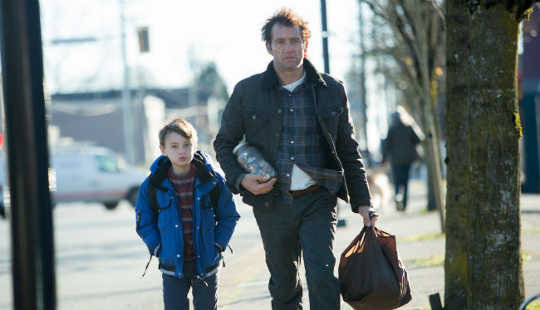
Many rural Americans feel the lasting effects of the 2008 recession every day. Wages have been stagnant for the past decade, and jobs have returned to cities at a rate 4 times faster than in rural communities. For many blue-collar workers, this type of financial difficulty can strain all aspects of life, from career opportunities to family relationships.
In his new film, The Confirmation, Bob Nelson explores these hardships of modern American life with a seemingly simple story about a father and his young son. Walt (Clive Owen), a recently evicted, out-of-work carpenter, has his antique tools stolen from his truck the same day he’s been tasked with watching his estranged son Anthony (Jaeden Lieberher). The two spend the next few days searching for Walt’s tools, his only source of income and pride.
Nelson is a native of Washington state and grew up in a large family dependent on the money his dad made as a mechanic. That relationship inspired his first screenplay, Nebraska, which was directed by Alexander Payne and won acclaim as one of the best reviewed films of 2013.
In both films, fathers and sons encounter hard-edged Americans—people struggling with unemployment, underemployment, drug abuse, and desperation—and exemplify why complicated relationships between fathers and sons are worth the struggle.
Recently, I spoke with Bob Nelson and asked him how these fictional fathers and sons reflect his relationship with his own dad, and what it’s like making independent films about blue-collar families at a time when blockbuster franchise entertainment rules the cinemas.
Christopher Zumski Finke: Both The Confirmation and Nebraska are set in small, western towns running on a blue-collar economy. What draws you to those kinds stories?Nelson: That’s pretty much my background. I started out in a small town south of Seattle, in Kent, Washington. In those days it was more rural. My dad was a mechanic and we lived on his paycheck. There were five kids, seven of us total. It was a good life in some ways, but as far as money goes it was always a little tight. My mother finally went to work when I was in junior high to help compensate for that.
I learned from Harper Lee, how she took her life and turned it into To Kill a Mockingbird.
I worked my way through high school and college as a janitor. That was back in the ’70s. By the time I finished college in 1978, I was making $5 an hour as a janitor. And it wasn’t that long ago that janitors were still making $5 an hour, thirty-some odd years later. Meanwhile prices have gone up five or ten times on things. That always sticks with me, and I think that it’s important in film that we reflect that.
Zumski Finke: Do you think there is a lack of films about blue-collar workers in Hollywood?
Nelson: I do. You see it more in novels. I don’t even see it that much in television, although we’re seeing more shows in recent years because of Netflix and Amazon and we’re getting more diversity there. But films, we’re still catching up.
Zumski Finke: Both the films you’ve written not only focus on small, economically depressed communities, but also on fathers and sons.
Nelson: Both films draw heavily from my own life. I learned from Harper Lee, how she took her life and turned it into To Kill a Mockingbird. Some of it’s true, but you take that truth and turn it into something else. It might seem odd but both fathers in Nebraska and The Confirmation come from my own dad. Bruce Dern and Clive Owen might not seem to have a lot in common but there is a kernel there.
When I wrote Nebraska I used a lot of my family stories, a lot of it coming from my uncles. My dad lost his teeth at the railroad tracks, and he was shot down in WWII, which I didn’t know about until I was an adult.
Zumski Finke: Do you have a son, or children of your own?
Nelson: No I don’t. This is all based on my recollections of being the son. I can take a sidelong glance at my friends and relatives who have kids, but I mainly am drawing on my own relationship with my dad.
Zumski Finke: Religion plays an important role in the film. Can you talk a little about how that that is influenced by your relationship with the Catholic church and with your parents?
Nelson: My dad, I don't think he was real religious. He just went along. My mom was a devout Catholic and still is. She’s 88 years old now. I started out Catholic and drifted away in my teens.
When wages are low people can get desperate, feed off each other, and lash out.
Anthony’s confessional scenes are pretty close to reality for me. Confession was always a little scary. Unlike Anthony who is so honest he can’t tell any sins to the priest, I didn’t do that. If I couldn’t think of any I would make them up.
Zumski Finke: In the film, church and economics seem connected. Do you think that your mom’s relationship with the church was related to your family’s economic situation?
Nelson: At the time, in the 1960s and early ’70s when I was going to church, there certainly was a community feel. Where I grew up, I don’t think the economic divide was that large. We all felt part of the community in that we were all in this together. We didn’t have people living in mansions, and we didn’t have a lot of poverty around us. We were all lower-middle class.
Zumski Finke: I like what Walt says to his son about religion, essentially, church is something you can do that makes your mother happy, and it’s not difficult or burdensome.
Nelson: Walt’s trying to make a case for his son to be good, and do good. One example of that in the movie is that it doesn’t ever occur to Walt to steal somebody else’s tools.
As many times as my dad watched his tools stolen, I could never imagine him, even with his troubles, stealing someone else’s tools. I think Walt is finding a moral course of his own but finds the church is unnecessary for him.
Zumski Finke: There is a pretty terrifying withdrawal scene in the film. Can you talk about the decision to make that scene quite as intense as it was?
Nelson: My dad was a lifelong alcoholic—a functioning alcoholic like the fathers in Nebraska and The Confirmation.
At one point he gave up drinking. I was probably a little older than Anthony at the time, but he went through withdrawal that was pretty close to what you see there. And I didn’t know what was happening. I didn’t know something like that could happen when you stop drinking.
Zumski Finke: A lot of the characters in the film are in various states of unemployment, drug addiction, or alcoholism. You have a film full of people who are struggling to make it as best they can.
Nelson: It’s true, even when you finally come upon the true thief.
A lot of decisions come out of desperation. When wages are low people can get desperate, feed off each other, and lash out.
{youtube}YUyl6fQdEtU{/youtube}
About The Author
Christopher Zumski Finke wrote this article for YES! Magazine. Christopher blogs about pop culture and is editor of The Stake. Follow him on Twitter @christopherzf.

























